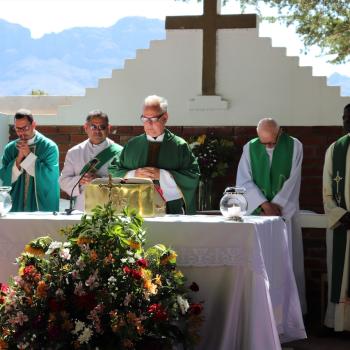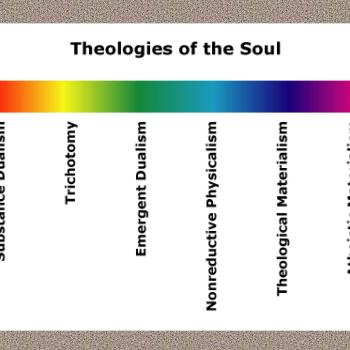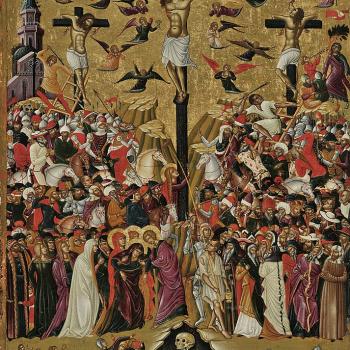
Salvation is by grace, not works. Grace is given out to sinners, blessing them so that they can be transformed and changed by it. God hopes, by giving it out so freely, that sinners will stop sinning and become holy saints. God constantly shares grace to everyone in the world; no one, not even sinners, are free from its blessings. Indeed, without such a blessing, without grace, we could never become the person we are meant to be.
God doesn’t wait for us to repent, nor does God wait for us to realize we are in need of grace to shower us with it. God’s gift of grace comes first, and through that blessing, we are able to be enlightened, even if a little, and receive what we need so that we can then cooperate with grace and begin our long journey to sainthood.
To deny sinners God’s blessings is to deny them what they need to find salvation. This was emphasized by St. Paul throughout his writings, such as when he said:
But God, who is rich in mercy, out of the great love with which he loved us, even when we were dead through our trespasses, made us alive together with Christ (by grace you have been saved), and raised us up with him, and made us sit with him in the heavenly places in Christ Jesus, that in the coming ages he might show the immeasurable riches of his grace in kindness toward us in Christ Jesus. For by grace you have been saved through faith; and this is not your own doing, it is the gift of God — not because of works, lest any man should boast. For we are his workmanship, created in Christ Jesus for good works, which God prepared beforehand, that we should walk in them (Eph. 2:4-10 RSV).
Grace perfects nature. Nature is good. When we follow the nature given to us, we follow that good. Grace encourages us to embrace it, to draw it out of us, helping that natural goodness which is within us grow. No matter how much we have sinned, and so, gone against our natural good, there will always be some good in us, something which grace can be used to help develop and nourish. We will never be so evil that God’s blessings can’t help us and lead us to our natural (and supernatural) perfection. To be sure, as our nature is something which we did not make for ourselves, it is something which God gave to us, making it also a blessing which God gave to us, showing that life, existence, itself is a blessing. This is why it can never be said that our works save us, because our good works follow from the blessings God has given us, from our nature, to the perfection of that nature, and finally, to the transcendent good of never-ending theosis we hopefully will experience in eternity.
Sin is a denial of grace, a denial of our nature, a denial of love. Our denial of our nature, and therefore, of love, does not completely destroy our relationship with grace, our relationship with God’s blessings; rather, every time we turn away from God, God finds a new way to engage us, and each time God does that, God blesses us and gives us once again the potential we need to cooperate with grace.
Sadly, it seems many Christians only want God to curse sinners, to be a retributive judge who damns people for their sins. That is, they do not want sinners to ever receiving God’s blessings in their lives, for they think, in doing so, it means God would be blessing sin. But the whole point is that God comes to those who are lost and blesses them so that they can repent and become who and what God made them to be. Without God first coming to bless sinners, sinners would never change. That is one of the lessons we should learn from the incarnation: God loves us, and God is willing to bless us with that love, even if we are sinners. This revelation got so many of Jesus’ critics upset. They demanded to know how and why he would dare bless sinners, not only with his presence, but with all kinds of miracles, healing them instead of letting them suffer the punishment his critics thought they deserved. How dare he reject the most rigorous interpretations of the law? But Jesus came to show God’s love to everyone, and that meant, to forgive and bless people – not because he agrees with sin, far from it, but because he sees the person behind the sin and the good within them, a good which God desires to bless:
When the judge wants to forgive, he regards the human being, not the offense. When the Father wants to show mercy to the son, he considers his affection, not the sin. So in the case of the human being God is mindful of his own work so as to forget the human being’s work. [1]
St. Peter Chrysologus pointed out that this is why Jesus willingly made his way into hell itself. God wanted to go to where sinners were at and offer them blessings so that upon receiving them, sinners could truly be raised up and freed from the bondage of sin and death:
Do you murmur, O man, about why God looks for the human being in the midst of his sins? What will you do when you see him penetrate the murky depths of hell for the sake of the human being? [2]
Sinners must be able to receiving God’s blessings if they are ever to become something other than sinners. We have been, and continue, to be blessed by God, even though we do not deserve it. We can never deserve it. No one can deserve God’s transcendent blessings. They are freely given. God shares them with everyone, indeed, to the whole of creation, so that creation can be lifted up and participate in the divine nature. The more we are like God, the more we will want to and will share blessings with all those around us. We will look at people for the good within them, a good which we should love; our focus will not be on their sin, but on them and who they are. God has shown us that this is the way. We are not justifying sin by doing so; rather, we are doing the reverse, we are following the way in which sin will be transcended and overcome. Those who would deny blessings to sinners, not those who would give them, are those who end up justifying sin, because they end up propping the sin up, making it something which cannot be overcome. They treat sin as an eternal truth greater than God’s love. They follow a dualistic mentality, one which say there are those who can never receive God’s blessings and love. Such dualism, however, has always been understood as one of the great denials of the Christian faith.
[1] St. Peter Chrysologus, Selected Sermons. Volume 2. Trans. Willam B Palardy (Washington, DC: CUA Press, 2004),209 [Sermon 54].
[2] St. Peter Chrysologus, Selected Sermons. Volume 2,210 [Sermon 54].
Stay in touch! Like A Little Bit of Nothing on Facebook.
If you liked what you read, please consider sharing it with your friends and family!
N.B.: While I read comments to moderate them, I rarely respond to them. If I don’t respond to your comment directly, don’t assume I am unthankful for it. I appreciate it. But I want readers to feel free to ask questions, and hopefully, dialogue with each other. I have shared what I wanted to say, though some responses will get a brief reply by me, or, if I find it interesting and something I can engage fully, as the foundation for another post. I have had many posts inspired or improved upon thanks to my readers

















